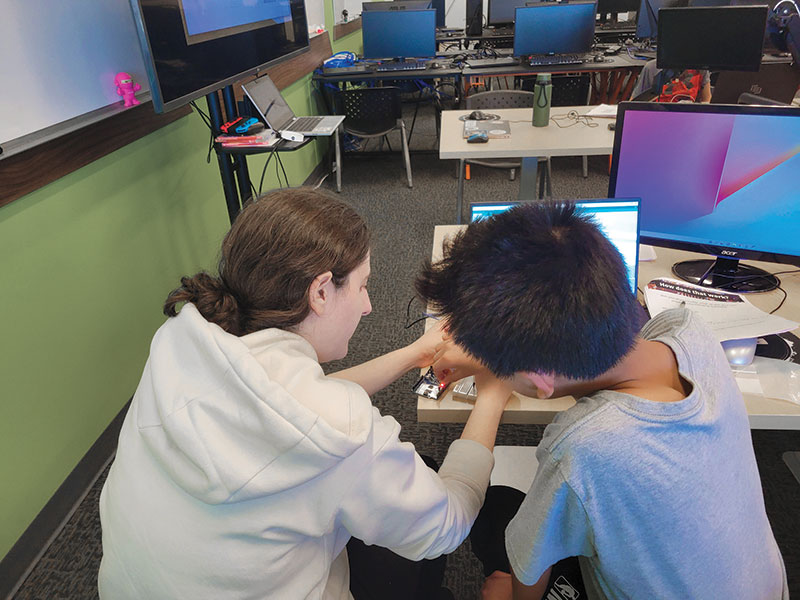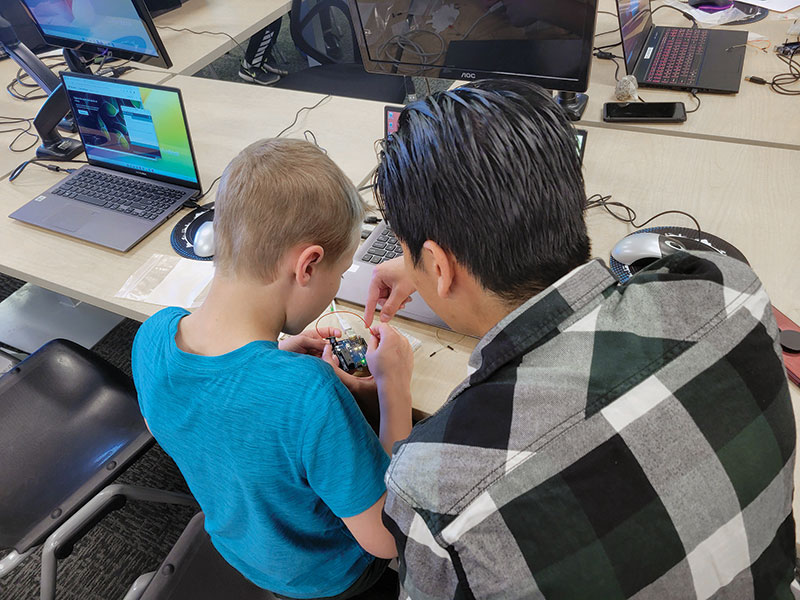Bringing Students Together After Remote Learning, and Beyond
Fall
2022
Feature
Bringing Students Together After Remote Learning, and Beyond
Michael “Bodhi” Rodgers, SPS Faculty Zone Councilor for Zone 14 and SPS Chapter Advisor, University of Colorado Denver
On February 29, 2020, the physics community received news that the APS March Meeting was canceled due to the then mysterious new coronavirus. The meeting was to begin on March 2, and many attendees had already arrived in the host city of Denver, Colorado. The University of Colorado Denver (UC Denver) and Metropolitan State University of Denver Society of Physics Students chapters quickly established opportunities for folks already in town to present their research at our joint campus.
Then, on March 11, UC Denver faculty received notice that we’d be testing remote course delivery over the next few weeks for a full transition to remote mode on Monday, March 30. But that wasn’t the end of the breaking news. On Monday, March 16, we were notified that campus was shutting down at 6 pm the next day and all work was moved to remote mode. All university buildings would be closed. They stayed closed until the beginning of summer 2021.
That summer our campus slowly began seeing activity. Classes were mostly remote, but research began to return. The fall semester was to bring a return to in-person classes with some hybrid and remote options, but we had a last-minute pivot (are you as tired of the word “pivot” as I am?). Two weeks of fully remote instruction jarred all of us eager to return to campus.
Despite the bumpy start, our department used a variety of methods to “restart” our in-person community and help physics students get to know one another better. To complement our SPS chapter, increase the variety of events in the department, attract new members, provide more leadership and ownership opportunities, and access more campus resources, in the fall of 2021 our physics majors created four affiliated clubs: Physics Club, Astronomy Club, Physics Identity & Expression Club, and PSI*, the Physics Student Innovators (*and alumni) Club. The leaders of each club met early in the semester to discuss how to set goals that worked together instead of overlapping. For example, the Astronomy Club might be very active in running observing nights as part of community connections, while the Physics Club might work on inviting speakers.
As the advisor to our SPS chapter (and some of the clubs), I meet periodically with the leadership for check-ins. We use the SPS chapter report template and rubric to set goals, and our check-ins focus on progress toward those goals and filling in areas for the chapter report; otherwise I stay out of the leaders’ way and let them do their thing. If I’m needed, the students will ask, and if I see something not happening, I step in to encourage and nudge.
Our UC Denver physics program also debuted three new one-credit professional development seminars (ProDev) in the fall of 2021. I created these seminars as a professor at Ithaca College and ported them to UC Denver.
Our advising team automatically enrolls all new physics majors in ProDev-I, so I have all of the new physics students each fall. This gives me the opportunity to have our SPS chapter leaders meet with the new students and talk about the role of SPS and the various clubs. Every other week our physics faculty give research talks. During the nontalk weeks, we discuss physics career pathways, read through sections of The Careers Toolbox, and discuss what it means to engage in undergraduate research.
ProDev-II is for students midway through their undergraduate physics career, and we look at opportunities to build resumes. This connects to SPS through leadership opportunities, presentations, and publication opportunities. I invite alumni to discuss their career arc from being an undergraduate physics major to their present position, and I reserve lots of time for students to ask questions. We also review many of the American Institute of Physics statistical data sheets, read through graduate school letters of reference, engage in a “translating the transcript” activity, and develop individualized plans on how to have a solid resume by graduation.
I’ve subtitled ProDev-III “Oh crap, I’m graduating.” We discuss how to apply to graduate school, find an appropriate graduate program, find jobs, write cover letters, request letters of recommendation, interview, and negotiate a job contract. This is not a drill. By this point many of the students will have already engaged with SPS and the clubs, but if not, they still have time to add some things to their resume.

 While these seminars are always filled with productive discussions, they were especially helpful during our return to campus. They helped our new and returning physics majors explore and develop their identity as a physics person in a low-stakes environment with high rewards. Each seminar meets weekly for 50 minutes, with lots of classroom discussion and whiteboard brainstorming, so they helped our physics students get to know each other better. Many students in ProDev-II had only met each other through Zoom classes. The seminars also helped our SPS chapter recruit new members.
While these seminars are always filled with productive discussions, they were especially helpful during our return to campus. They helped our new and returning physics majors explore and develop their identity as a physics person in a low-stakes environment with high rewards. Each seminar meets weekly for 50 minutes, with lots of classroom discussion and whiteboard brainstorming, so they helped our physics students get to know each other better. Many students in ProDev-II had only met each other through Zoom classes. The seminars also helped our SPS chapter recruit new members.
This particular year our clubs are working with our Office of Development to do a crowd-funding effort to raise money for the 2022 Physics Congress. We are also reaching out to alumni, applying for student travel funds available through various campus offices, and requesting support from our student government association with the aspirational goal of sending 16 fully funded students to the congress.
Our department had 25 new physics majors start the fall of 2021. Our ProDev-I seminar put these new students in contact with our SPS chapter student leaders early in the semester, the department provided free membership in SPS and a simple mechanism to complete the membership form, and we hosted a variety of club events to appeal to various interests. Together, these curricular and cocurricular activities create opportunities for physics majors to develop their physics identity, to connect as a community, to build resilience for future “pivots,” and to find their role in supporting the mission of the Society of Physics Students. All of these approaches were especially helpful after 14 months of remote-mode and Zoom fatigue, but they’re also a great way to build community as a regular practice.
To learn more, reach out to Bodhi Rogers at Michael.B.Rogers [at] UCDenver.edu.
Physics and Astronomy by the Numbers
The American Institute of Physics Statistical Research Center is your source for data on education, careers, and diversity in physics, astronomy, and other physical sciences. aip.org/statistics
The Careers Toolbox
The Careers Toolbox for Undergraduate Physics Students is an in-depth resource for undergraduate physics students entering the workforce after graduation. Many of the tools can also be applied to finding internships, research positions, or even entrance into graduate programs. spsnational.org/sites/all/careerstoolbox
